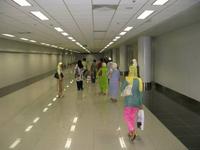-
Privacy pants for airport security
“Privacy pants” would allow airport security personnel to do their job while keeping passengers’ privacy and dignity intact
-
-
Former Guyana politician sentenced in JFK terror plot
Abdul Kadir, a former member of Guyana’s parliament, was sentenced to life in prison for participating in a plot to blow up the jet fuel supply tank system at JFK airport; the two other plotters are also of Guyanese origin: one, a former baggage handler at JFK, will be sentenced in late January; the other, Adnam Shukrijumah, has now been promoted to chief of al Qaeda’s global operations
-
-
Overflights over U.S. are not top-priority security concern

Terrorists who are trying to exploit cargo planes to launch an attack on the United States may find a security weakness in screening of cargo planes flying over, though not into, the United States; planes that go over the United States but are not supposed to land here are not routinely screened according to U.S. standards; U.S. officials say terrorist networks are trying to exploit cargo planes because it is so much harder to get operatives onto U.S. flights with weapons or explosives; security experts say targeting overflights for protection is a waste of scarce resources; a former TSA intelligence official said that part of the reason behind the lesser concern with overflights is that the “vast majority” of overflights originate in Canada, and the Canadians know how to screen; it is “not some Third World country,” according to the official
-
-
TSA to pay special attention to insulated beverage containers
TSA announced terrorists might use insulated beverage containers to conceal explosives, so in the coming days, passengers flying within and to the United States may notice additional security measures related to insulated beverage containers
-
-
Questions about TSA's approach to security technology
The massive push to improve airport security in the United States after the attacks of 9/11 led to a gold rush in technology contracts for an industry that mushroomed almost overnight; since it was founded in 2001, the TSA has spent roughly $14 billion in more than 20,900 transactions with dozens of contractors; in addition to beefing up the fleets of X-ray machines and traditional security systems at airports nationwide, about $8 billion also paid for ambitious new technologies; critics question whether TSA was too eager to look for technological solutions to basic security problem, and willing to write checks for unproven products
-
-
Congress to decide risk-based vs. 100% screening debate on air cargo security
One of the many aviation security-related issues Congress will have to grapple with is cargo security; TSA argues that risk-based strategies are adequate; Congress, though, is pressing for 100 percent screening of air cargo; the problem with a 100 percent security screening mandate is cost: the Congressional Budget Office (CBO) estimates a $250 million cost in the first year and $650 million per year for the following five years to implement the mandate for 100 percent baggage screening on passenger aircraft; the Congressional Research Service (CRS) estimates that the mandate could cost more than $700 million just in the first year and perhaps as high as several billion dollars annually
-
-
Yemen buys cargo screeners
Yemen is deploying Z Backscatter Vans from Billerica, Massachusetts-based American Science and Engineering Inc. to screen cargo and vehicles for explosives and contraband
-
-
White House held up regulation to stop gun flow to Mexico
Tens of thousands of semi-automatic rifles are smuggled from the United States to Mexico every year, increasing the level of violence of the war among the drug cartels and creating a situation in which the cartels often out-gun the Mexican police and military; on Friday, the ATF published an emergency proposal in the Federal Register; the proposal requires dealers to report to the ATF anytime they make two or more sales over a 5-day period of semiautomatic rifles that have a caliber greater than .22 and a detachable magazine; it would be valid for six months; Justice wanted the proposal to be placed in the Register in the summer, but the White House held it up — some say because of election considerations
-
-
U.S. anxious over terror attacks during holidays

Counterterrorism officials are tracking threats to the United States and Europe from al Qaeda and affiliated groups during the holiday season; the FBI and DHS have alerted state and local law enforcers to be wary of suspicious behavior and to change security measures regularly to interfere with any terrorist plans; the warning was sent in a bulletin Wednesday; there is specific intelligence of other attacks being planned against Europe during the holiday season, according to U.S. officials say
-
-
IATA unveils plan for airport security tunnels

The International Air Transport Association unveiled a plan to replace lengthy and sometimes intrusive passenger security checks at airports with a new system aimed at finding “bad people, not bad objects”; under the project, an early version of which could be in place within 2-3 years if governments cooperate, travelers would be directed down one of three security tunnels depending on profiles based on biometric data and flight booking data; the IATA plan would eliminate the need for nearly all intrusive screening as well as routine scanning and searches of carry-on luggage; IATA says the system would not be based on racial or ethnic profiling
-
-
FAA lost track of one-third of the 357,000 private aircraft in U.S.
The Federal Aviation Administration (FAA) is missing key information on who owns one-third — or 119,000 — of the 357,000 private and commercial aircraft in the United States — a gap the agency fears could be exploited by terrorists and drug traffickers; next year, the FAA will begin canceling the registration certificates of all 357,000 aircraft and require owners to register anew
-
-
TSA approves for-pay faster security lines at airports
TSA has given the green light to a “trusted traveler” lane at another one of the U.S. busiest airports; the lane at Denver International Airport is operated by New York-based Alclear LLC, a company that pre-screens fliers, giving them quicker access to security checkpoints
-
-
Smuggled snakes expose flaws in Indonesian airport security
Customs officials in Abu Dhabi arrest a traveler from Indonesia who arrived at Abu Dhabi with four snakes, two parrots, and a squirrel hidden in his luggage; Indonesian airport security officials say the only way the passenger could have smuggled the animals on board was for airport officials to be complicit in the illegal wildlife trade; this raises even more serious concerns about Indonesian airport security; in February, Indonesian customs officials seized 700 snakes and 3,400 pig-nosed turtles hidden inside a cargo consignment marked as fresh fruit
-
-
New underwear line reminds TSA of the 4th Amendment
If you are not happy with the new, intrusive security measures TSA has mandated at airports across the United States, you may wish to buy “4th Amendment Wear”; metallic ink printed on shirts spells out the privacy rights stated in the amendment and is designed to appear in TSA scanners; the 4th Amendment Wear line also includes non-metallic options, including underpants for both adults and children; should a passenger be stripped down, instead of the full amendment, they will receive a more direct message: “Read the 4th Amendment Perverts”
-
-
A woman wearing only black underwear gets hour-long airport security search
An Oklahoma woman tried to avoid being subjected to an enhanced pat-down at the Oklahoma City airport by showing up for the flight wearing only her underwear; the fact that she was wearing black knickers and a black bra did not make a difference, though: after traces of nitrate were found on her body, she was given an enhanced search, which made her miss her flight to Phoenix
-
More headlines
The long view
New Technology is Keeping the Skies Safe
DHS S&T Baggage, Cargo, and People Screening (BCP) Program develops state-of-the-art screening solutions to help secure airspace, communities, and borders
